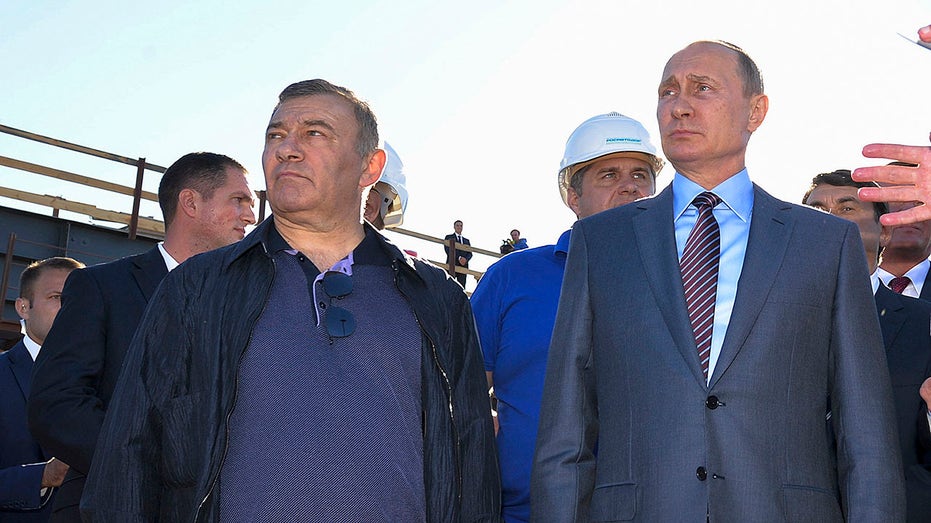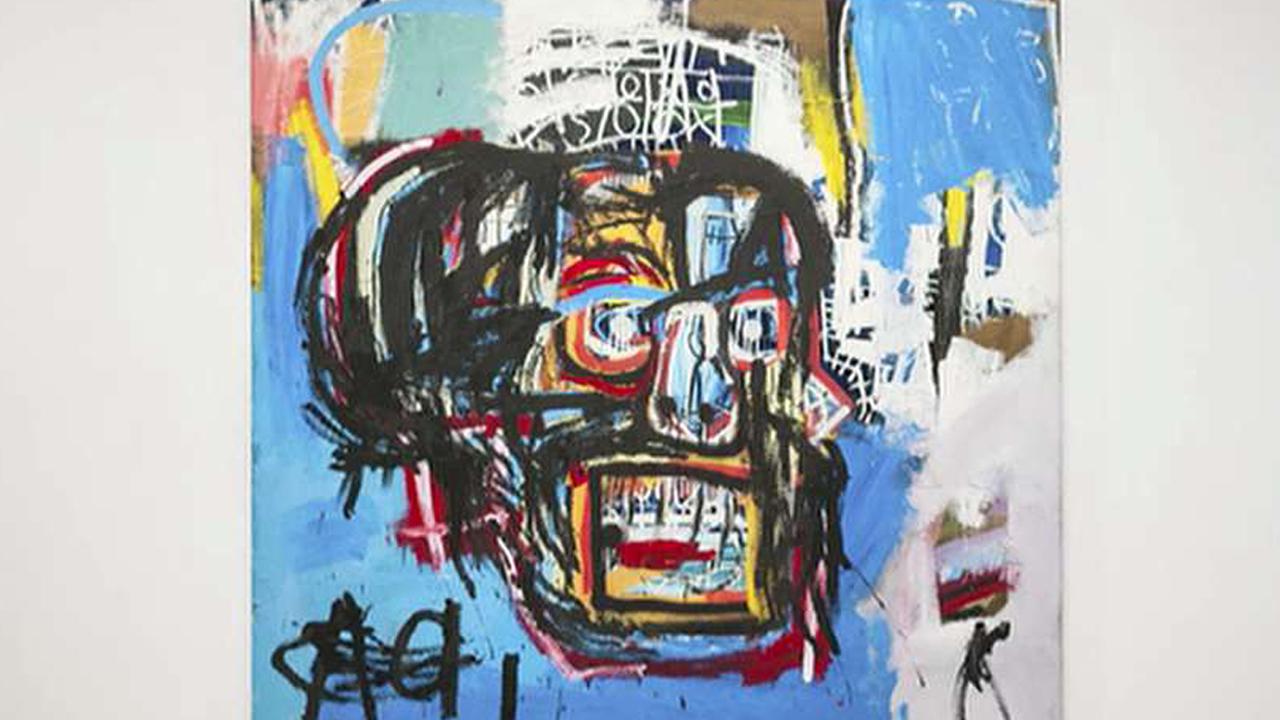How two sanctioned Russian billionaire brothers bought art anyway
Senate investigation says art collectors circumvent U.S. laws to buy, sell and launder millions through art; Rotenbergs deny the claims
Two months after the U.S. imposed sanctions on Russian construction billionaires Arkady and Boris Rotenberg in March 2014, the brothers sent their art adviser on a shopping spree, according to a Senate investigation report released Wednesday. At a Sotheby’s auction that month in New York, the Rotenbergs, who are lifelong friends of Russian President Vladimir Putin, paid $6.8 million for 10 works of art, including a cubist still life by Georges Braque and a swirling tableau by Marc Chagall, the report said.
HOCKNEY PAINTING SELLS FOR MASSIVE SUM AT SOTHEBY'S
Days later, the Rotenbergs again added to their collection, paying a private U.S. dealer $7.5 million for “Chest,” René Magritte’s 1961 painting of a colorful pile of buildings, according to the report. When Senate investigators later asked the art dealer if she had vetted the buyers’ identities to make sure they weren’t blacklisted, she said she never asked. When it comes to due diligence, the report said, “She relies on her guts.”

FILE - In this Sept. 15, 2016, file photo, Russian President Vladimir Putin, right, joins businessman and billionaire Arkady Rotenberg, during to a visit to the construction site of the Kerch Strait bridge in Kerch, Crimea. (Alexei Druzhinin/Sputnik,
Who is buying art these days? Such disclosure details in art deals like these are being scrutinized following a two-year investigation by the Senate Permanent Subcommittee on Investigations, which alleges art is increasingly being used as a tool by blacklisted individuals to evade sanctions. The report directed sharp criticism at auction houses and art dealers for doing little to screen or stop sanctioned people from trading art in the U.S.
Companies based in the U.S. are forbidden by law from having any financial dealings with sanctioned individuals. Americans caught transacting with the Rotenbergs or any sanctioned individual can face steep fines or even jail terms. The seller of a painting isn’t required to ask or know the identity of the buyer to close a deal, though, because blue-chip art isn’t subject to the same anti-money-laundering disclosure laws that govern U.S. banks.
The art world has installed its own disclosure protocols, but has long struggled to enforce them. Collectors prize discretion and don’t always want their identities or income sources shared. Dealers likewise tend to be tight-lipped about their major clients, and no one wants to cede business to rivals willing to ask less and sell more. This helps explain why so many catalogs brim with works whose only ownership clue is “private collection.”
JUSTICE DEPARTMENT SEEKS WARHOL, MONET PAINTINGS TIED TO 1MDB SCANDAL
“I know the auction houses and dealers don’t always want to know who they’re selling to because they’re making significant money, but we also have a national-security interest in making sure sanctions work,” said Sen. Rob Portman (R., Ohio) who led the bipartisan report with Tom Carper (D., Del.). “Secrecy is the problem,” Sen. Portman added.
Even after meeting with Senate investigators in 2018, Sotheby’s and Christie’s competed last year for the chance to auction Lyonel Feininger’s “Bridge II,” a painting investigators said the Rotenbergs likely owned. Christie’s said later it didn’t know the work’s true seller at the time. When Sotheby’s won the consignment, it asked the Rotenbergs’ alleged adviser for the work’s owner and was told it belonged to a Marshall Islands company. The house gave the painting a $5 million estimate and included it in its February 2019 London sale. Just before the auction, the house pulled the work; Sotheby’s told investigators the work hadn’t elicited any potential bidders.
Altogether, the report alleges the Rotenbergs used U.S. dollars to spend or move around funds totaling $91 million, including $18.4 million in art and antiques, since sanctions were imposed.
Sen. Portman said he and Sen. Carper launched the investigation two years ago to research the efficacy of U.S. sanctions imposed on members of President Vladimir Putin’s inner circle in March 2014, weeks after Russia annexed the Crimean Peninsula and launched a covert military operation in eastern Ukraine. Arkady Rotenberg, a St. Petersburg native and industrialist who befriended Mr. Putin when they joined the same judo club as children, was among those sanctioned. His brother Boris was added shortly thereafter. But after more sanctions were imposed on a wider circle of Russian oligarchs in 2018, Sen. Portman said he and other legislators “wanted to figure out why the sanctions didn’t appear to be working.”
Senate investigators who briefed The Wall Street Journal on the report’s findings said they started looking broadly at blacklisted Russians but soon focused on Arkady Rotenberg’s art-collecting activity. Eventually, they expanded their investigation to art bought by his brother and son, Igor, who is also sanctioned. Investigators said the family offers a case study in how some blacklisted Russians are using the opaque art market to circumvent financial restrictions.
NYPD BUDGET CUTS AN 'ACCOUNTING GIMMICK': FORMER COMMISSIONER
Christie’s, Sotheby’s and the smaller London houses, Phillips and Bonhams, are all named in the report for doing business with the Rotenbergs. Spokespeople for each said they had zero tolerance for evasion of sanctions and were willing to work with the U.S. government on this issue. The houses also said they didn’t know the Rotenbergs were bidding through an alleged art adviser, Gregory Baltser, until investigators informed them of the connection. All said they stopped allowing him to bid after Senate investigators came asking questions.
“I was shocked when I found out,” Phillips’ Chief Executive Edward Dolman said.
Mr. Baltser, a naturalized U.S. citizen who lives in Russia, confirmed that his company, Baltzer LLP (the misspelling is intentional), has aided Russian collectors in the past but through his lawyer denied that he ever bid on behalf of the Rotenbergs. His lawyer, in a statement, said the investigation has “done substantial collateral damage to Baltzer and its employees, and has forced Baltzer to largely suspend operations.”
A representative for the Rotenbergs called the Senate allegations “totally absurd” and said they never used any tools, including art, to launder money or circumvent sanctions. “All transactions with works of art made by Rotenberg family members or on their behalf were made openly, strictly with lawful personal purposes and always on market terms,” the statement said.
In 2018, the European Union amended its anti-money-laundering regulations to require businesses to verify the identities of sellers and buyers of art valued over €10,000.
The Senate report recommended ways to alter U.S. laws to compel more disclosure in art sales, but so far two bills that could potentially address the issue are stalled.
Arkady Rotenberg, now 68 years old, built a nearly $3 billion fortune, according to Forbes, overseeing infrastructure companies. His brother Boris and son have made fortunes in industries like energy and real estate.
Until now, little was known about the composition or extent of the Rotenberg collection. The brothers have been seen at judo and ice hockey matches in Russia but seldom attend glamorous gallery dinners or make buzzy purchases.
The report alleged that for at least a decade the brothers have been collecting modern art, particularly surrealists like Salvador Dalí and Giorgio de Chirico as well as Tamara de Lempicka and a few contemporary artists like Andreas Gursky.
To unravel the trail of their art hunt, investigators culled records from auction houses as well as suspicious-activity reports submitted to the Treasury Department. They also tracked payments in Russia through one of their nine offshore accounts to an account managed by the public face of their collection, their alleged adviser Mr. Baltser, according to the report.
Unlike the Rotenbergs, Mr. Baltser appeared to seek the art spotlight, opening a Moscow hangout called the Baltzer Club (the misspelling is intentional) where he invited Russia’s newly wealthy art lovers to watch global auctions and bid, ideally through him. His website offered to help collectors bid with “anonymity,” according to the report.
In 2010, the report said, a company incorporated in Belize called Steamort Ltd. started paying Mr. Baltser $9,500 a month for “acquisition of works of art,” according to a copy of the agreement described in the report. The report said it couldn’t name the owner of this account. But it said until October 2018, Mr. Baltser continued collecting monthly Steamort fees for art services, ultimately amounting to at least $1.1 million. Mr. Baltser confirmed he had been paid by Steamort for consulting services but said his contract forbade him from disclosing its clients’ identities.
In 2012, Christie’s asked Mr. Baltser who owned Steamort, and the alleged adviser initially said he didn’t know, according to the report. “When pressed and threatened with missing the opportunity to bid at an upcoming auction, Mr. Baltser verbally told Christie’s that Steamort was owned by ‘Luisa Brown,’ ” the report said. The report added that Christie’s ran checks to see if Ms. Brown was sanctioned anywhere; when she wasn’t, the house cleared Mr. Baltser to continue bidding—but the house told investigators it never received documentary evidence proving that Ms. Brown actually existed or owned Steamort. Mr. Baltser declined to comment on Ms. Brown.
CLICK HERE TO GET THE FOX BUSINESS APP
Two years later, Mr. Baltser signed a partnership deal with Christie’s that allowed his team to conduct his own anti-money-laundering checks on his clients who wanted him to bid on their behalf at Christie’s—an arrangement Christie’s agreed to so long as Mr. Baltser sent in annual compliance certifications confirming he wasn’t bidding for anyone sanctioned, the report said. Mr. Baltser’s team sent a letter the following year certifying he hadn’t bid for anyone blacklisted but didn’t send another for the next three years, despite repeated requests from Christie’s compliance team. Christie’s renegotiated the agreement in 2018 to require he submit identity details after each purchase, the report said.
Christie’s said it couldn’t comment further on the matter of Ms. Brown or the Baltzer LLP partnership, which it ended amid the investigation.
Sotheby’s declined to enter a similar partnership with Mr. Baltser but continued to do business with him—even after a Sotheby’s employee told her managers in 2012 that Mr. Baltser was an adviser to the Rotenbergs, the report said. The employee later told investigators she had lied to her managers and didn’t actually know Mr. Baltser bid for the brothers. Sotheby’s said in the report she merely spotted the Rotenbergs in a article about wealthy Russians and pitched them as potential clients, pre-sanctions.
In January, Mr. Baltser wrote a column for Forbes Russia where he said the art market needed to be prepared to divulge more ownership details in art deals moving forward. “I would call these changes revolutionary,” he wrote. “And although the movement towards transparency is compulsory and not welcomed by everyone, these innovations are undoubtedly a healthy and positive trend: the conservative art industry lacked an openness towards which the whole world is gradually moving.”'




















